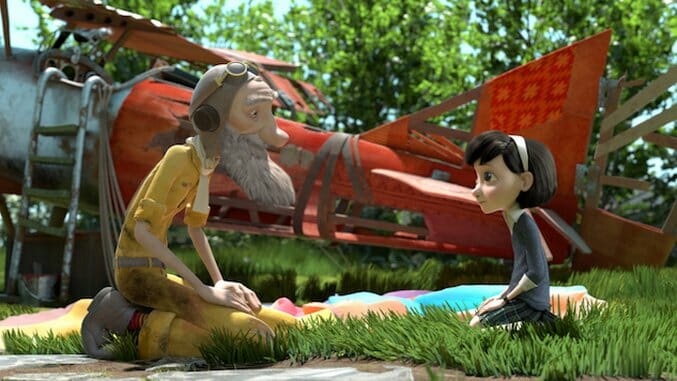
Summarily dropped by Paramount a week before its U.S. theatrical release earlier this year, the film adaptation of Antoine de Saint-Exupéry’s seminal novella The Little Prince curiously feels like a case of both studio intervention and clever meta-revision. It’s a strange film—and not just because it finishes the entire story set out by the original source material before the first hour is over. But even as it struggles to not undermine its own messages in its second half, Mark Osborne’s adaptation bursts with life, and serves as an overly blunt but effective story about growing up without losing why childhood mattered. Or as the film succinctly puts it: It’s the difference between growing up and becoming a grown-up.
After an introduction that establishes the material’s interest in ambiguity via the classic imagery of a boa constrictor digesting an elephant in its stomach-slash-hat optical illusion, director Osborne creates a new framing device for Saint-Exupéry’s story of allegorical power—a little girl (Mackenzie Foy) who’s living a painfully practical existence. She lives with her single mother in the house next to the narrator, The Aviator (a madcap Jeff Bridges), her mom (Rachel McAdams) planning out every minute of her day, as represented by a comically detailed wall tableau.
At first engrossed in her mother’s wishes, the girl is nonetheless drawn to The Aviator even as he nearly kills her in their first encounter with a haywire propeller. The Aviator is mortified about the accident and tries to apologize, but it’s not until he sends part of the book he’s writing—the prose of The Little Prince—that he grabs the girl’s interest. A friendship develops, and soon the little girl hungers to hear more of the narrator’s story and The Little Prince’s adventures that he’s written over many years.
Cutting between Bridges’ folksy narration and the internal world of the story he’s telling, the film flashes between computer-generated animation with photorealistic environments and stunning stop-motion. The animation echoes the tonal divide between the two halves of the story. In the real world, it is most readily evocative of a European-tinted The Incredibles, with characters with bubble eyes and proportionate bodies, but also a firmly realistic understanding of the world.
The storybook world, on the other hand, is presented as a sprawling diorama fantasia with The Little Prince (Riley Osborne), made up of malted wood and meticulous tissue paper placement, and the world around him layered in fine fabric, construction paper and purposely artificial details like stars hanging from a string off the top of the frame.
The little girl is pretty obviously a device, editorializing The Aviator’s story and poking holes in its surrealist logic—for example, The Little Prince travels across the universe with a group of balloons—and belaboring the story’s larger messages about the importance of imagination.
These scenes are sometimes distracting, and reveal the schematic plotting, but there are parts where such layers between the storybook and the active narration in the real world provide their own synthesis—a scene in which The Aviator has a coughing fit mid-scene in the story is particularly dramatic. Co-written by Irena Brignull, who had a hand in Laika Studios’ black sheep The Boxtrolls, and veteran animator Bob Persichetti, the film knows how to juggle all of these elements skillfully.
That said, it’s not insignificant that some main characters are little more than blips in the story, even when performed by heavyweights like Marion Cotillard, Benicio Del Toro and Albert Brooks. It’s difficult to expand these characters when they’re based on a single trait—the king, for instance, is a man whose whole conceit is that he believes he can control anything, even the sunset—but these scenes sometimes feel rushed, particularly in an extended sequence involving a fox (James Franco) who says enigmatic things like “We’re both too young to know how to live” and later becomes a mute central character.
And without spoilers, at one point The Little Prince diverges completely from the original. True to the film around it, there’s some question to whether it’s actually happening—and the moment happens after a cut to black. It’s a somewhat organic evolution of the story that comes before, converging contexts of the little girl’s own world and the little prince’s world, but it also can’t help but come across like wish fulfillment.
The Little Prince is a conflicted final product. The film is admirable for its gentle hand when it comes to difficult subjects like the ephemeral nature of life, and its bold visual style, but it’s also a film whose final reel seems unwilling to recognize the realities of its own story. Instead, The Little Prince offers easy ends to questions that were better left unanswered.
Director: Mark Osborne
Writers: Irena Brignull and Bob Persichetti, adapted from Antoine de Saint-Exupéry’s book
Starring: Mackenzie Foy, Jeff Bridges, Riley Osborne, Rachel McAdams, Paul Rudd, James Franco, Marion Cotillard, Albert Brooks, Benicio Del Toro, Ricky Gervais
Release Date: August 5, 2016